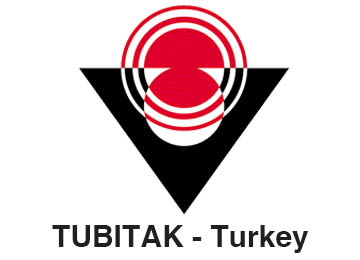- THE COMMISSION
- SECRETARIAT
- CONSULTATIVE COMMITEE
- NETWORK OF CENTRES
- PROGRAMMES
- COMSATS’ Programmes
- COMSATS’ Ongoing Projects
- Skill Development Programme
- International Thematic Research Groups
- Science Diplomacy
- National/International Events
- Scientific Activities Sponsorship
- Scholarships and Fellowships
- Expert Exchange Programme
- Distinguished Professorship Scheme
- COMSATS’ Panel of Experts on ST&I Policy
- Centre for Climate and Sustainability
- COMSATS Joint Centre for Industrial Biotechnology (CCIB)
- COMSATS and Corona
- PUBLICATIONS
- ARCHIVES
- ANNOUNCEMENTS
TUBITAK MAM-Turkey
The Scientific and Technological Research Council of Turkey (TÜBİTAK), Turkey

Introduction:
TUBITAK, founded in 1963, is the leading agency for management, funding and conduct of research in Turkey. It is a governmental body, which operates with adequate administrative and financial autonomy. More than 2,500 researchers work at 15 research institutes and research centers attached to TÜBİTAK, where both contract-based and targeted nationwide research is conducted.
Focus Areas:
TUBITAK’s focused areas include: Machine Production Technologies; Materials, Metallurgy and Chemical Technologies; Electrical, Electronic Technologies; Information Technologies; Biotechnology, Agriculture, Environment and Food Technologies; Basic Sciences; Health Sciences; Electrical, Electronics and Informatics; Engineering, Environment, Atmosphere, Earth and Marine Sciences; Agriculture, Forestry and Veterinary; Social Sciences and Humanities; Defense and Security Technologies; Construction, Maintenance, etc.
Laboratories:
The various laboratories operating under the attached Institutions of TUBITAK are listed below:
Food Institute
- Alternative Disinfection and Processing Technologies Laboratory
- Nutrition Laboratory
- Food Microbiology and Biotechnology Laboratory
- Mineral Analysis Laboratory
- HPLC Laboratory
- Enzyme Laboratory
- Physical Analysis Laboratory
- Functional Foods Laboratory
- Chemical Analysis Laboratory
- Packaging and Preservation Laboratory
- Food Molecular Biology Laboratory
- Residue Analysis Laboratory
- Mycology Laboratory
- Mycotoxin Laboratory
- Cereal and Cereal Products Laboratory
- Fats and Oils Analyses Laboratory
Institute of Chemical Technology
- Adsorbent and Adsorption Technology R&D Laboratory
- Forensic and Security Materials Technology Laboratory
- Biocomposite Research Laboratory
- Energetic Materials Laboratory
- Photonic Laboratory
- Gas Chromatography Laboratory
- Heterogeneous Catalysis Research Laboratory
- Drug Research Laboratory
- Catalyst Research Laboratory
- Advanced Polymeric Materials Research Laboratory
- Inorganic Analysis Laboratory
- Inorganic Material Research Laboratory
- Coal and Biomass Research Laboratory
- Mass Spectrometry Laboratory
- Medical Technology Laboratory
- Nuclear Magnetic Resonance Spectroscopy (NMR) Laboratory
- Thermal Analysis Laboratory
- Petroleum Products Analysis Laboratory
Materials Institute
- Aluminium Process Technologies Laboratory
- Impact Test Laboratory
- Super Alloy Casting Laboratory
- Electron Microscopes and Atomic Force Microscopes Laboratories
- Photonic Technologies Laboratory
- Investment Casting and Titanium Technologies Lab
- Coating and Corrosion Laboratory
- Composite Laboratory
- Metallography and Failure Analysis Laboratories
- Nanotechnology Laboratory
- Mechanical Testing Laboratories
- Gas Sensor Test Laboratory
- Ceramic Test and Characterization/Powder Metallurgy Laboratories
- Sol – Gel Functional Coating Technologies Laboratory
- Underwater Acoustic Laboratory (UAL)
- Non Destructive Testing Laboratories
- X – Ray Diffractometer and Spectrometer Laboratories
Genetic Engineering and Biotechnology Institute
- Vaccine Technology Laboratory
- Plant Molecular Biology and Genetics Laboratory
- Bionanotechnology Laboratory
- Enzyme and Fermentation Technology Laboratory
- Enzyme and Microorganism Genetics Laboratory
- Animal Genetics and Reproductive Biology Laboratory
- Immunogenetics Laboratory
- Molecular Cellular Biology Laboratory
- Diagnostic Technologies Laboratory
Earth and Marine Sciences Institute
- Active Tectonics Research Laboratory
- Accelerated Mass Spectroscopy Laboratory
- Industrial Services Provided By Laboratories
National Metrology Institute
- Physics Group Laboratories
- Mechanics Group Laboratories
- Chemistry Group Laboratories
Environment and Cleaner Production Institute
- Marine and Inland Water Laboratory
- Air Pollution and Control Laboratory
- Solid and Hazardous Waste Laboratory
- Water and Wastewater Laboratory
- Geographical Information Systems and Remote Sensing Laboratory
3B Centre of Excellence:
Launching of biomaterials, biomechanics and bioelectronics (3B) Centre of Excellence under Material Institute of TUBITAK Marmara Research Centre (MAM). The centre aims to develop and produce high-tech materials and devices for health sector through national capabilities and to conduct R&D on nanocarriers, biosensors, and biomaterials.
Expertise:
TUBITAK has expertise in Food Technologies, Energy, Chemical Technologies, Environment and Cleaner Production, Materials Sciences, Earth and Marine Sciences, Genetic Engineering and Biotechnology, Advanced Technologies, Electrical and Cryptology, Information Technologies, Software Technologies, Cyber Security, Space Technologies, Metrology, Fundamental Sciences, Management Sciences, etc.
Looking for:
TUBITAK is looking to have collaborations in the following fields: Halal food, Biomechanics and Bioelectronics, Repair & Maintenance of Laboratory equipment, etc.
Collaborations with other Centres
- Government of Tunisia: TÜBİTAK MAM and the Government of Tunisia, one of the COMSATS’ Member States, are cooperating in the following fields: Environment and Cleaner Production, Energy, Genetic Engineering and Biotechnology, Food, Chemical Technology, Materials and Earth, Marine Sciences etc. The cooperation would be possible by means of student programs, EU programs and H2020 through bilateral and multilateral agreements.
- Al-Farabi Kazakh National University, (KazNU), Kazakhstan: During COMSATS’ 21st Coordinating Council meeting, TÜBİTAK MAM pledged to collaborate with KazNU in multiple fields.
- Tanzania Industrial Research and Development Organization (TIRDO), Tanzania: TÜBİTAK MAM and TIRDO are planning to collaborate in multiple disciplines including energy; engineering; food science and technology; biotechnology; materials technology; environment; and chemistry.
Web entries
- COMSATS Liaison Officer from TUBITAK MAM, Turkey, visits COMSATS HQ
- TÜBİTAK Marmara Research Center (MAM), Turkey, hosts the 15th Meeting of COMSATS Coordinating Council
- Executive Director’s Visit to TUBITAK Marmara Research Centre, Turkey
